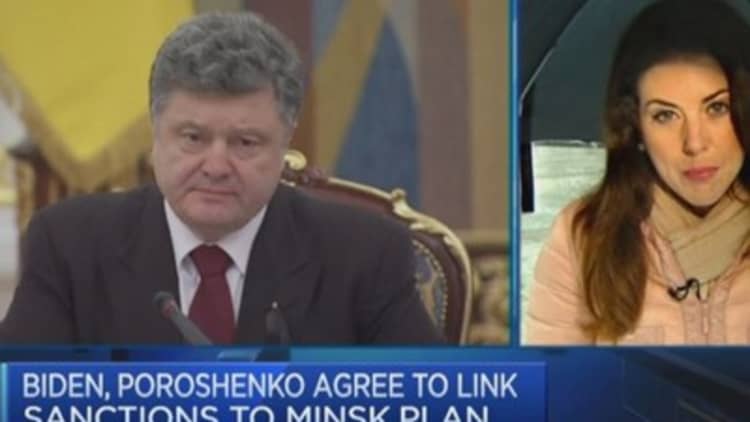
A massive show of force by the Russian military on the anniversary of its disputed annexation of Crimea has raised questions about Moscow's defiance over eastern Ukraine, and led to concerns that President Putin could be seeking more "foreign distractions."
With rising domestic problems in Russia and the prospect of more sanctions looming, the likelihood of further foreign "provocations" by Russian President Vladimir Putin have increased, according to a closely-watched political analyst.
"Rising domestic socioeconomic stresses in Russia – caused by dwindling oil revenues and the impact of Western sanctions – will fuel President Putin's anti-western rhetoric and increase the likelihood of him seeking foreign 'distractions'," Alastair Newton, senior political analyst at Nomura, said in a note Wednesday.
"We therefore expect Russian provocations in its 'near abroad' to continue, including in NATO territory, short of an outright 'land grab'."
The comments come a year after Russia's formal annexation of Crimea – an event that Moscow called Crimea's "reunification"– and as Western leaders contemplate extending sanctions on Russia in order to ensure it abides by a ceasefire agreement with Ukraine.
But although Putin admitted on Wednesday that the sanctions were damaging, he appeared defiant over Crimea and Ukraine, indicating that there is little appetite in Russia to back down over its apparent drive to reclaim territories lost after the break-up of the Soviet Union in 1991.
Read MoreUkraine PM toRussia: 'Get out of our land'
"Even if the situation in eastern Ukraine remains relatively calm…we believe he has plenty of other neighborhood options available," Newton said in his report, entitled "Russia: Red Storm reviving."
"The recent launch of military exercises involving disputed territories such as Crimea, Abkhazia and South Ossetia is an indicator of this, sending further warning signs to neighbors and the West alike."
More sanctions?
In the last year, Russia has become increasingly politically and economically isolated from the West, following its annexation of Crimea and its part in the conflict in east Ukraine.
Further sanctions are expected to be a hot topic at a European Union (EU) summit on Thursday, with plans afoot to link sanctions to the full implementation of a Ukraine ceasefire, as U.S. Vice President Joe Biden and Ukraine President Petro Poroshenko are reported to have agreed Wednesday.
After over a year of conflict, a second ceasefire in eastern Ukraine was agreed in February, although its implementation has been fragile at best. It is believed that by extending sanctions, the West could put more pressure on Russia to abide by the agreement.
Read MoreWe're not distracted by Russia crisis: Nato
This could mean that sanctions remain in place until the end of the year, when Ukraine is expected to regain control of its eastern border. Currently, sanctions are due to expire on July 31.
Timothy Ash, head of emerging markets research at Standard Bank, told CNBC that the EU summit would focus on mounting tensions over Ukraine and Russia's next moves.
"The focus is on Ukraine, and Putin has not yet got what he wants there so he will continue to tighten the grip, which means (an) escalation (of tensions) until the West or the government in Kyiv buckles," Ash said Thursday.
Popular Putin
Sanctions placed on Russia by Europe and the U.S. have added to the country's economic decline, on the back of the falling oil price and Russian ruble. Russia is expected to enter a recession this year.
Despite political and economic chaos, public support for Putin remains strong, however. Up to 100,000 people gathered in Moscow on Wednesday to celebrate the anniversary of Crimea's annexation, chanting "Russia, Russia" as Putin addressed crowds, according to Russian media agency RIA Novosti.
Read MoreRussia needs oil at $102 a barrel to survive: Strategist
In a show of force on Wednesday, Russia held military drills across the country with 20 of its ships conducting drills in the Baltic Sea, Russian media reported. In addition, NATO's Baltic Air police intercepted Russian fighter jets over the Baltic Sea, the Lithuanian authorities said Wednesday.
Such moves were "saber rattling" according to Ash, and didn't mean that Putin was going to make any land grabs elsewhere.
"He is not that stupid," Ash said. "I think he understands that crossing the border in the Baltic countries, for example, would be a huge escalation, and actually risk conflict with NATO."
"He will make noises elsewhere - saber rattle etc, but the big prize is Ukraine. Pressure on NATO in the Baltics, for example, is to force the West to concede ground in Ukraine"
- By CNBC's Holly Ellyatt, follow her on Twitter @HollyEllyatt. Follow us on Twitter: @CNBCWorld


